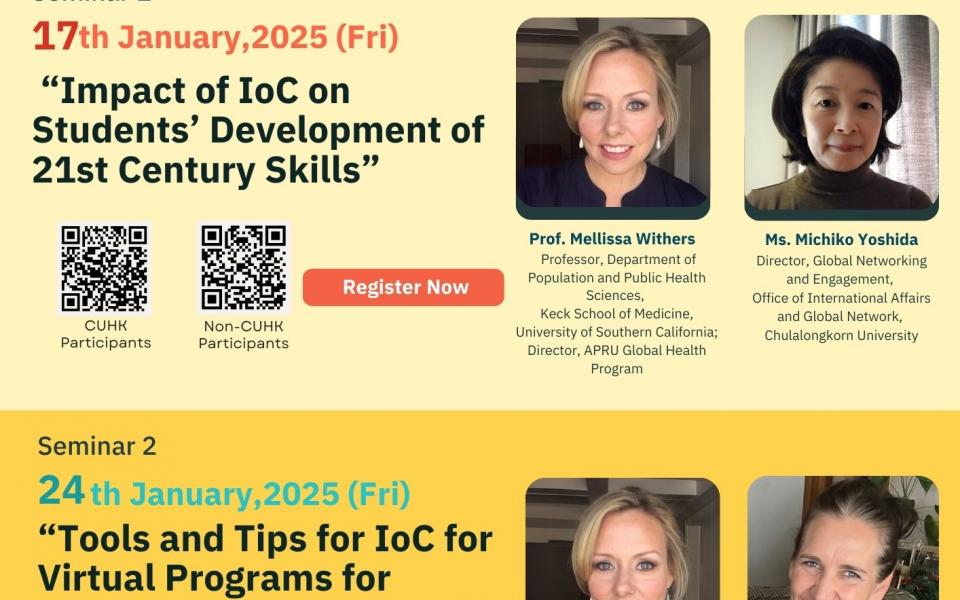Internationalization of Curriculum (IoC) for Sustainability Education (SE) Seminar Series - Seminar 1: Impact of IoC on Students' Development of 21st Century Skills Seminar 2: Tools and Tips for IoC for Virtual Programs for SE
Supporting the below United Nations Sustainable Development Goals:支持以下聯合國可持續發展目標:支持以下联合国可持续发展目标:
Seminar 1:
Date: January 17, 2025
Time: 9:00-10:30
In this interactive session, we will explore the impact of IoC on students, focusing on education around sustainability. IoC can equip students with the knowledge, skills, and perspectives needed to address today’s and tomorrow’s global environmental challenges. Integrating diverse disciplinary and cultural perspectives around sustainability education can foster cross-cultural understanding and innovative problem-solving. Students gain a comprehensive understanding of sustainability that transcends local contexts, preparing them to engage with complex global issues like climate change, sustainable development, and social equity. Exposure to international frameworks and collaborative projects enhances critical thinking, cross-cultural communication skills, and adaptability, vital for careers in an interconnected world. Ultimately, internationalized sustainability education empowers students to become informed global citizens and leaders.
Seminar 2:
Date: January 24, 2025
Time: 9:00-10:30
In this interactive session, we will discuss tools and strategies for IoC in virtual programs focusing on sustainability education. By blending technology with pedagogical best practices, educators can design engaging, accessible, and culturally-enriched curricula that prepare students to tackle sustainability issues in a global context. Through virtual experiential and problem-based learning experiences, we can facilitate opportunities for students to collaboratively develop solutions to environmental and social challenges. But how to best develop meaningful virtual opportunities to connect students with peers in other countries can be complex and maybe even daunting for educators. Two educators will provide examples and tips for such programs. Key considerations include aligning content with international sustainability frameworks, fostering inclusivity, integrating diverse global perspectives, and leveraging real-world case studies for global insights.
Mellissa Withers, PhD, MHS serves as Professor, and Director of Pedagogical Enrichment and Training in the Department of Population and Public Health Sciences at the University of Southern California Keck School of Medicine. She is also the Director of the APRU Global Health Program, a non-profit network of 60+ universities in the Asia-Pacific. Her work focuses on a broad range of global health issues, including sexual and reproductive health, gender-based violence, and mental health, with a particular emphasis on qualitative methodology. Dr. Withers’ dedication to pedagogical excellence has been recognized through several teaching awards, underscoring her ability to inspire and educate the next generation of health professionals. She earned a Ph.D. from the UCLA Fielding School of Public Health, a Master’s in Health Sciences from the Johns Hopkins Bloomberg School of Public Health, and a B.A. in Global Development from UC Berkeley.
Ms. Michiko Yoshida is the Director of the Global Networking and Engagement, Office of International Affairs and Global Network, Chulalongkorn University. Since 2019, she has been supporting Chulalongkorn University’s global engagement efforts in the context of its expanding public role to build a sustainable society. With 34 years of experience in the non-profit sector promoting international intellectual and cultural exchanges, she is committed to the co-creation of knowledge that cultivates empathy and a culture of mutual respect amongst peoples. Cutting across boundaries, she facilitates international intellectual exchanges, dialogues, and collaborations among academics, civil society actors, policymakers, and community stakeholders. Together with key international partners, Michiko spearheads several initiatives that promote transdisciplinary and multi-stakeholder engagements through university efforts at national/regional/global levels. She is the Program Chair of the APRU SDG Education for Global Citizenship program; a Co-convener of the regional platform Civic Engagement 4.0~Dignity, Justice, Sustainability, which launched “Training the Trainers for Engaged Social Service in a Borderless World” (training for displaced teachers from Myanmar) in 2023; and the Project Director of the CU-UNESCO Futures Literacy Project in which Chulalongkorn University established its UNESCO Chair for Resource Governance and Futures Literacy.
Judith McCool is an Associate Professor and Head of School of Population Health, University of Auckland. Judith is Co-Director of a newly formed Centre for Pacific and Global Health; one of eight research centers at the University of Auckland. Since 2009, she has been actively involved in the delivery of postgraduate courses in global health for the Master of Public Health, and since 2015, she has served as the Director of the Master of Health Leadership Program and is the leader for Global Health Leadership stream. Judith brings experience in global health and health communications with an emphasis on building capacity and strengthening evidence to improve health and wellbeing. Judith’s work focuses on social and globalized commercial determinants of health, including the role of digital and social media as communication tools for social change. This work has included research into the process of adapting, implementing, and evaluating the impact of mHealth initiatives on low resourced populations. Judith has developed long-term partnerships with colleagues in the Asia and Pacific region via her role as WHO advisor in Western Pacific Region (WPR), member of the Asia Pacific Rim Universities Global Health Steering Group, and as collaborator on international research and supervisor of graduate students.
